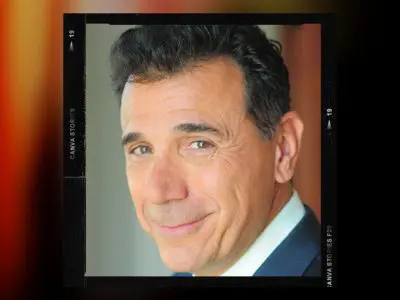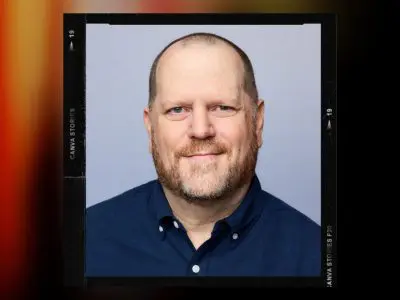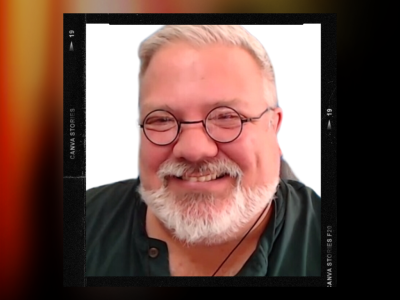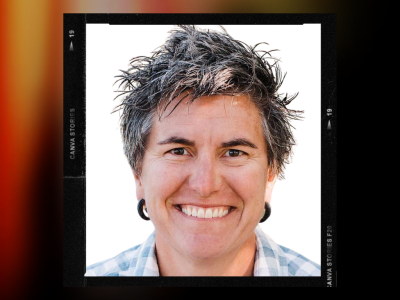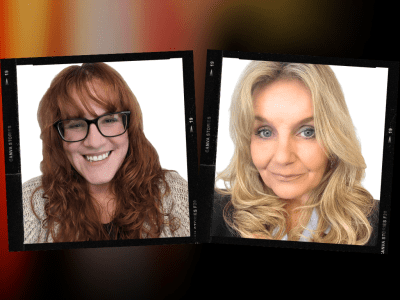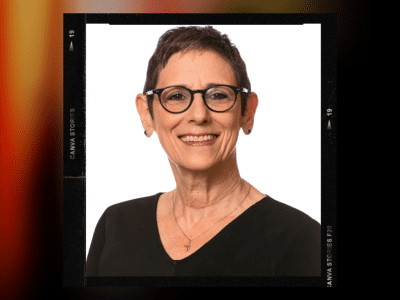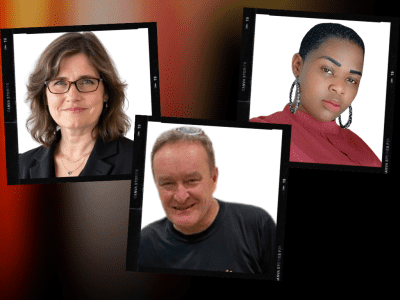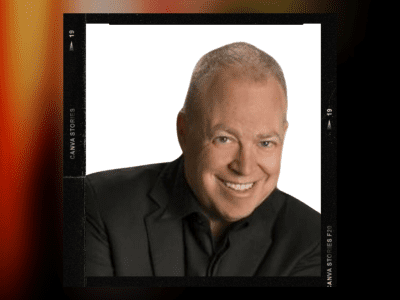Jumpstarting Performance at Work
w/ Anais Rodriguez
Use the buttons above to listen now.
Transcript - Jumpstarting Performance at Work
Rich: On this episode of team building saves the world,
Anais: you want them to experience life because that’s going to bring better ideas and you want them to understand what’s going on in the world because we’re marketing to consumers who are living in the world or employees will give it to other employees.
Right? Thanks. Really. Thanks for helping me. You stayed late and you reviewed that deck for me. Here are a couple of points. If I ever go to jail, you’re going to be my first call because you always pick up the phone and we kind of laugh now because Now it’s the rate all, all, everybody’s all about. And we’re like, yeah, we, you know, we’ve been doing it forever.
Rich: Hello team. It’s me, your old friend, Rich Rinnonsland, host of team building saves the world. The show where I speak to thought leaders from around the world, discussing variable strategies and tools to help you and your team build a better work environment. And today let’s hit the ground. running as we discuss jump starting employee performance with the COO of the Third Eye, Anais Rodriguez.
But first, I need to share some love with my supporters at Team Bonding. If your team is ready to experience teamwork to the power of play, then visit teambonding. com to learn more. Now, team, please give me a big hand and join me in welcoming my guest, Anais Rodriguez. Anais, hello!
Anais: Hey,
Rich: it’s great to be here. It’s lovely to see you too. Thank you so much for coming on board. Taking this time away from what you have described as a dreary day in Miami. Yes. Which I mean, still a dreary day in Miami compared to the Boston area. Okay.
Anais: I love Boston
Rich: and I love Miami. So there we go. It’s a love love, but, um, let’s start off real quick before we start just going off on more tangents.
Can you please, as I normally do just described my team out there, who you are and how you got into this industry.
Anais: Sure. So, um, like you mentioned, my name is Anais Rodriguez and I’m the Chief Operating Officer here at the Third Eye. I actually got into this business, um, not really knowing a lot about advertising.
So I studied marketing at Florida State University. Originally, I really wanted to do accounting. Um, I’ve always been a math person, but I ended up getting into the business. school and really gravitating towards marketing. And I thought, okay, I want to work for a big organization at that time in college.
I really thought, you know, I’ll probably work for something like Coca Cola, McDonald’s, big brands, but then I graduated and I went to get my MBA and I graduated in 2008. Right around the recession, and it was very difficult to find a job. So at that point, I was very fortunate to get an opportunity to work at a large independent Hispanic agency down here in Miami.
They actually reached out and said, hey, we have a traffic manager role. I had no idea what that was. That’s now what we consider a project manager. And I was like, I guess I’m gonna be directing traffic, but I needed a job and I said sure. So I spent my first couple of years in the real world as a project manager.
Um, I actually got to work on Ford, so it was a really big, wonderful account to kind of delve and get into the world of marketing and advertising. And then from there I moved on to account management and I really spent most of my career in account management roles. I was not really. Ever anticipating getting into operations.
I think because of my background in project management and my love of finances, it was something that was organic to me, even though I dealt mostly on the day to day with clients and, you know, their businesses and the campaigns we were running, I always had a knack and I loved being involved in all aspects of the agency.
So the 3rd, I, um, we actually had 1 of the original owners retire 2 years ago and with that came an opportunity for this leadership role to oversee operations. So I’ve been in this role now a little over 2 years. I really, really have enjoyed the. Employee experience, recruiting side of things. That’s something that’s a little bit newer, even though I would, you know, interview and look for talent in my previous roles.
This has been really great. And then just a little bit about the agency. We are a health and wellness advertising agency. Okay. We are independent and woman owned as well. Um, and we’ve been working with clients on their marketing campaigns for over 25 years now.
Rich: That’s fantastic. But as the COO, as you say, you’re starting to get into, or have had to get yourself into employee experience building.
How would you define employee performance and why do you think it’s important to the, to the running of your, of a modern
Anais: industry? So I think that most would. Define employee performance as productivity and task oriented for me and us at the third eye. We have sort of another layer where we like to think of it as how do employees add to the overall culture of the agency.
Again, like I mentioned, we’re in advertising, marketing, so culture, creativity, collaboration is very key to what we do where we like to say that we’re in the service industry because we’re serving servicing clients and, you know, ideas are the moneymakers here. So we have to make sure that we’re creating a collaborative and creative environments.
It’s not just about completing tasks. So that’s when I view employee performance. Those are kind of all the things that I’m looking at in totality.
Rich: I kind of want to start on the negative and then we’ll build to the positive from there if you don’t mind. Sure. What kind of barriers are we, are hindering employees when it comes to employee performance?
Anais: Well, I would say the most obvious to start with is that the last couple of years have been tough for anybody on a personal level on a work level career level. So, I think that going from working in an office 5 days a week with people, and then shifting to remote, not being in the office together, and then even shifting.
So we’re a hybrid agency, right? We come into the office 2 days a week. But again, we are. All about collaboration and ideas. So I think that one of the barriers is definitely not having that interaction that FaceTime anymore. You’re adding a lot of steps right before you were able to pull somebody and say, hey, I have a question about this.
And now it’s like, I have to get on someone’s calendar. Right? So I think that that’s definitely been tough for people to kind of navigate and figure out how am I going to work now? I think everybody. I don’t think we’re coming back. Right? I know there’s all these, you know, articles about
Rich: everybody’s trying to everybody’s trying to pitch the other way.
Anais: Right? That’s not going to happen. So you definitely have to focus on how do you make things easier for your employees? Because you still expect that performance, right? You’re giving them that flexibility, that autonomy of saying, you know, you come into the office. Half the time, or when you want to, or whatever setup you have, but making sure that those barriers are not there, that they’re staying connected, that they’re understanding.
That’s sort of the price you pay, right? We’re giving you that flexibility now of hybrid, but now you have to close that gap of those 3 days that you’re not in the office. So, I would say that’s definitely 1 of them. I also think that specific to our industry, marketing and advertising. It’s a tough time. I think that clients want to do a lot more with a lot less the last couple of years.
We’ve heard speech market a lot in our industry. So. You know, I’ve been doing this over 15 years. When I started, I, we always joke about this. You know, you’d have 6 months to put together a TV commercial. Now clients in a month want a whole campaign. So I think that that’s definitely tough because for somebody, especially the people that have been in this industry a long time, it’s a big adjustment to say, wait a minute.
I used to have a lot more time to think and work on things like this. And now it’s that’s that’s not the norm anymore. So time management is key and understanding. How am I going to get all of this done and still have that quality there of my work?
Rich: Plus, how are you doing that without risking employee burnout on now more rapid paced jobs and still letting them work from home where they’re not bouncing off ideas from one another?
I mean, what are some of the methods you’ve seen?
Anais: I think that we implemented a few things, I think ironically, because we’ve never pressured employees to come back to the office five days a week, or we’ve been kind of a little bit more flexible. And I think. Trusting and remembering that we’re all adults here.
I’ve actually gotten a lot of feedback of I want to be in the office more or you know what? The 2 days I go in, I don’t see this person that I work with because her 2 days are different or this department. I never get to see them. So it’s been nice because I think a lot of leaders are probably pushing a lot more enforcing things, so they don’t get that response.
So, because of that, we’ve implemented quite a few things and we started last year because I started receiving that feedback. We implemented something called department week. So we have about 9 or 10 departments in the office and I would select maybe 1 or 2 weeks, split up the agency and everybody had to come in Monday through Thursday.
Okay, and essentially, let’s say we, you know, we get our creative team, our media team, and our account management team, and then the rest of the teams come on a different week. But the idea is to have whole departments together because that was the other thing. Because you want coverage from departments, they’re not usually all together in the office.
Right? Right. So this allows a whole department to be together. They can also be with other departments that maybe they need a little bit of team building with those departments when it comes to, you know, ideating for campaigns and that what we ended up doing is I gave them, you know, sort of some guardrails.
Like, Hey, I want to make sure that 1 day is team building. 1 day is learning and 1 day is something fun. Right? And believe it or not, they took it and ran with it. So when I tell you that, you know, I got decks. With schedules and all the ideas that they were going to do, they came up with content for our social media on, you know, how they were going to promote and talk about what we were doing for department weeks.
We have a logo. We have swag for the weeks. Now. Everybody gets very excited. It becomes almost like a competition between the weeks to see who’s going to come up with the greater ideas. That’s been really great to watch them, um, take that and, and again, it’s, they want to be in the office and they want to do those things.
And, and that’s been really great to watch.
Rich: So, are you seeing that you’re getting better output from people in this hybrid way of existing or? Yeah,
Anais: so I would say overall, yes, it’s not 100%, right? I do think that there are sometimes employees where that doesn’t work for them, um, because. You know, they aren’t as connected or they get distracted distracted and they need a little bit more oversight.
But I would say overall, we’ve seen. You know, a very positive impact on the hybrid work. People are less stress, right? About things like pickup for their kids because they know, okay, I have the flexibility. I have threes at home. I can work around and that’s what we expect. Right? We kind of tell them. Hey, you have 3 days at home or from wherever.
Right? We have to be at home. So try and make your appointments and your things those days. Right? So that when you’re here, the other 2 days, you’re really here and I say that most people. Tell me that the three days they’re at home are the days that they get a lot of work done and the two days that they’re here are more of that collaboration and connecting with their colleagues.
Rich: Okay, so are you finding that this helps a lot more with, say, like, work life balance? And is that something that’s important in employee promotion?
Anais: Absolutely. So I actually say this to my clients a lot because they forget that we’re people. So I always remind them, you know, um, when they want fast turnarounds and as an agency where we’re partners with our clients and, you know, last minute thing, whatever you need, we’re going to do it for you, but it’s all about sending, setting boundaries.
So because we’re in advertising, I always tell my teams, my clients. The last thing you want is a creative director who sits at a desk all day working 12 hours for you. You want them to experience life because that’s going to bring better ideas and you want them to understand what’s going on in the world because we’re marketing to consumers who are living in the world.
But this may not be a popular opinion here, but. To me, work-life balance is sort of a partnership between the employee and the organization. I see a lot of organizations out there saying like, we’re all about work-life balance. This is all that we do. But I think that the employee also has to come to the table, um, and make sure that they are setting boundaries for themselves.
Mm-hmm. , and that they have good time management skills as well. Um, I am a mother of two now, so I have very good boundaries, but early on in my career I didn’t. Right. And I just, Worked all the time, and I always think about that. If I would have never gotten married and had children, I probably would have continued doing that.
So that’s important to me. And when I meet with employees who are struggling with work, like, don’t answer feeling burnt out. I always, you know, come from a place of. What boundaries are you setting for yourselves? How are you managing your time? Um, and it’s easy, especially for our creative teams to get lost in the work, right?
And they want it to be perfect. And so they may spend a lot of time on something that maybe instead of six hours, it could have just taken you two or three, right? We have a saying here that we say a lot, perfect through iteration, right? The first time it doesn’t have to be perfect because the client has to see it, they’re going to have changes.
So get it, you know, get it 90% there because you’re going to get feedback and then you can work on those tweaks next time. Don’t, don’t kill yourself
Rich: that first time they’ve heard. Throughout many of these episodes that if you’re having a problem with that work life balance, and you’re having a problem with motivation at work, that it’s usually management caused.
How can you keep an eye out as the management level, um, to make sure that your employees are taking care of themselves and, and being self motivated, especially when you talk about a hybrid solution.
Anais: There’s a couple of different things that we do. Um, first I love surveys and they have to be anonymous.
So I’m all about getting information. I probably do it to 2 to 3 times a year and the questions range from everything to, you know, we put on a new dog policy at the office and I want to understand how people feel about it all the way to help people feel about their managers and leadership. So that helps me a lot in identifying things that may not be on my radar and addressing them.
And I’ve, I’ve come up. With some themes right where I notice, okay, I’m getting a lot of this and I haven’t seen that before through that. We actually started doing what we call state interviews, right? Opposite of exit interviews and employee experience needs those. And that’s been really key to I think that sometimes employees with their direct managers.
Even though here, everybody, we’re all, you know, very close, it’s, you know, we’re a 30 plus shop agency. So I think it’s important for people to have another avenue and not their direct manager to kind of talk about. What they’re, you know, if they’re hitting any obstacles, if they’re struggling with anything.
So that’s been very key. Our employee experience team is wonderful at making people feel comfortable enough to kind of talk through those things. Right? So that’s been really key and helping people and us identifying this person struggling, you know, do we need to identify. Support for them, should they not be working on this type of work?
Do we sort of need to, you know, sit down and say, okay, this is where you do really well. These types of projects aren’t so let’s move things around and we’re definitely open to those types of things. I think it’s important that people are doing work that they enjoy. You’re not going to always do it, but at least a good majority of the time, it’s something that you’re good at and that you’re able to you can’t see through right without burning out is really important to us because again.
Bye That’s what we’re turning into our clients, right? That’s the
Rich: deliverable. Uh, Anis, this is great, but I hope you don’t mind. I do need to step away for a quick second while I tell my team out there about a company, I am so proud to be a part of team bonding. Team bonding was founded over 20 years ago with one simple question.
How can employees have a great time while fostering strong, authentic bonds between people who work together? No matter where your company is located, Team Bonding offers powerful, engaging, custom team building events designed to get the best out of your team anywhere in the world. They’ve created a catalog of innovative events using the power of play as a learning tool and tapping into the correlation of work and play.
So from scavenger hunts to jeopardy and so much more, the team bonding of activities, be they live, virtual, or hybrid maximizes the impact of team building with an accent on fun. This is a team bonding. com to schedule your event. Now team bonding when you want seriously fun results. And speaking of fun, I’m having some fun here with any use Rodriguez.
We’re talking about empowering your employees. What about team building, Anis? Is that something that you, because you had mentioned how sometimes you do do that for your groups. Do you find that that, while it’s good to bring the team together, is that enough to motivate the individual
Anais: as well? So that’s actually very interesting.
Um, I don’t think everybody gets as much from team building as, you know, one person may get a lot more than another individual. It really depends on their personality, right? And where they are in their… Life at that moment, right? Uh, you know, is there, is there tank full or is it empty? And they don’t, they don’t want to have any team building at the moment.
And we definitely have those moments. Um, I think we’ve done team building where, you know, it’s been more the traditional stuff. We’ve actually, our last department week, we had someone come teach us line dancing and we’re all doing line dancing. And that was really fun. Um, so I definitely think that sometimes team building.
Some people see it as a little bit maybe corny, and especially for large organizations, people are like, Great, now I have to go and be like with all these people that I really have no interest in.
Rich: I have seen many of the eye rolls over the years, until they
Anais: get into it. For us, we actually, I think just in general, my philosophy from an employee experience standpoint is to really let the employees lead and ask them what they want.
Right? I talked to a lot of leaders where they have issues sometimes with, you know, certain groups or being able to kind of bring people together. And I always ask, have you asked them what they would like to do? And most of the time they give me a blank stare. So we implemented ERGs now, it’s been about 2 years and we have So many of them.
So we have a book club, which I’m a part of. We have our sneakerheads ERG. We have our, um, you know, pride. We have, we have a ton of them. And what’s been great is that that’s really employee led and self led. So they’re doing the things they wanted to do. And that is team building, right? Without it being feeling like, oh, it’s corporate and people are making me do this.
And, you know, we do just recently for pride month, the pride ERG went to a drag brunch and they all went and, you know, they send pictures and we post on social and they have a great time. The book club meets every month at the office at the end of the day and, you know, and we’ll have maybe some charcuterie and a little bit of wine sometimes and, you know, and the sneaker heads have a group.
Chat and they talk about all the sneakers that are coming out and they do their thing. And we also have a sports one. So it’s, I think to me, that’s a lot more authentic. Um, so from an organization perspective, we support them. They usually get a stipend every year, but it’s really not led by me nor the employee experience team.
Rich: Okay. Now what about, um, recognition? Uh, is this something that you think is important for them to have? Or do you think singling out somebody kind of Ruins it for
Anais: others. Well, I think a lot of that has to do with the culture that you have. Okay. Our culture is we love celebration, ritual, praise. So I don’t think it’s seen as negative if somebody is, um, called out.
So we do a couple of different things. We have our quarterly staff meetings. We have our values. Which are heart, hustle, humor, and honesty. And what we do is every quarterly stock meeting we give out value awards. So who has exemplified one of those values during that quarter? Sometimes it is a decision that leadership comes to, but I have gotten emails where another employee says, Hey, so and so should really get the hustle award this quarter because she helped me with x, y, and z.
And it’s really great. So that will give out something else that we do. We, um, one of the perks that we have at the, at the agency is a platform called Fringe. So it’s essentially a gamified fringe benefit where you, we give points every month. To the employees as part of, you know, their benefits package and they can use the points to purchase.
I mean, you know, we have some that save every month because they want to buy a Disney cruise or you can just do, you know, Uber eats gift cards or, you know, anything. A lot of it is also focused on health and mental wellness, so it’s different apps or vitamins or things like that, which we’re always looking for opportunities like that for our employees.
You can also gift points so. That happens quite often where leadership can give points in addition to the ones that employees get on a monthly basis or employees will give it to other employees, right? Thanks. Really? Thanks for helping me. You stayed late and you reviewed that deck for me here. A couple of points.
And then we also have our internal newsletter. Where we really always try to highlight employees. So it may not be a kudos. You did a good job. It may be somebody that has this hobby. That’s really great. Or somebody that has like a hidden talent, our employee experience manager. She is very funny and everybody loves when she reenacts and does different characters.
So we’ll do a series of different things and videos. So we’re definitely always hiding, highlighting our employees within that newsletter and on our social channels as well.
Rich: Since the pandemic, do you find mental health? Is something you still need to focus on for your groups and how important is that?
Anais: Absolutely. Yes. So I think for us, we’ve been in business now for 25 years. We’ve always been into health and wellness. We kind of laugh now because now it’s the rate all, all, everybody’s all about it. And we’re like, yeah, we, you know, we’ve been doing it forever, . Um, so, you know, I, I wanna start, when, when you think about mental health, obviously a lot of people think about the employee, but I think it’s even a tougher time for the managers because now when you manage employee.
You’re really managing the whole employee, right? And I think before, you know, three years ago, you just cared about, they came in, clocked out and
Rich: that’s it. You didn’t have to play therapist for the
Anais: group under you. Um, I, everybody says that I’m, I’m, I’m the community therapist here. Um, you know, everybody knows that you can talk to me about anything, but I do.
Always think that what’s most important is to start with support for the managers, right? Not everybody is as empathetic or wants to talk about things like that with their employees, but it’s important now. And that’s the expectation from employees. So I think that that’s really important to make sure that they have the tools they need to have those types of conversations.
And if they don’t. It’s really important that there is an employee experience department or HR department that can kind of have some of those conversations for you because that’s what people are looking for. Now. They want to be able to talk about it. So I think 1 of the reasons we went with fringe is because a lot of what you can get with the points was in that mental health space, right?
It can help with top therapy. It can help kind of attribute to that. And when we were looking at benefits to give. Again, I go back to, I don’t want to tell people what type of benefit, right? So we could have done a class class, but that’s kind of exercise. What if people don’t want to do that? Right. So that’s why we really gravitated towards that platform because it allowed them, um, and mental health is not only just a therapist, but it has financial planning services, finance, or something that leads a lot to, you know, um, to mental health issues.
So making sure that they have whatever the support is, childcare, you know, that’s another thing that they can use their points for. And because we’re predominantly women at the agency. That whole You know, transition to motherhood is really important to us, but just as important for men. So it’s been already about a year.
Last year, we put into place having 12 weeks paid paternity leave, both for men and women at the agency and just making sure that we’re doing what we can to kind of take that burden off, especially. It’s been so difficult the last couple of years, just. Child care costs are rising, but also during the pandemic, it was kind of hard to have child care.
Um, so I think for us, you know, that’s a trend that we’re really happy to see where organizations are really focusing on that. So we do a lot of that work with our clients and it’s something that’s important to us for our employees.
Rich: It brings up a really interesting point, though. If I mean, you call your or you’re called by your associates, your team’s therapist.
That’s a heck of a responsibility to take on. How do you keep yourself from burning out?
Anais: That’s so funny. I worked with a leadership coach last year and he used to ask me about all the time. He used to say, what do you do for you? Um, you know, it’s, it’s kind of weird, but in a way, um, doing what I do is kind of like therapy for me and it really helps me and it makes me feel like I have purpose.
Um, but I definitely, you know, I have, we, I have one of my leaders. She always jokes and says, if I ever go to jail, you’re going to be my 1st call because you always pick up the phone. Um, and it’s, but it’s the truth. I, to me that I know that they’re working really hard. You know, it’s a tough business to be in, and I want to be able to be there for them.
But with that, you know, I also have to. Find that boundary right that I was talking about earlier and make it right. Tell them. Okay. I’m helping you to this point, but now you got to figure out everything else. Right? And again, it’s just resources. So I make sure that I’m always looking for opportunities, not only for the agency, but for me, we’ve had.
Mental health coaches come in, talk to us about how some people may be draining to you and finding all employees are not created equal, right? So you work with and could affect how you’re talking to somebody else or treating someone else. So it’s just really about finding those resources and making sure that I’m also listening to them, you know, as a leader, can
Rich: your employees give you points?
Yes, or they can’t, that’s fantastic. See, that’s what I’m talking about. You’re a rare breed of manager. It’s just that simple. What advice can you give? To those other COOs, those other managers, HR professionals, whoever they might happen to be, to help get as good a connection as you have with your team or, or to help their
Anais: team better.
If you had to ask my team to describe me in one word, I think they would say consistent. Okay. And I always tell people that when, you know, I obviously am a leader here, but I have other leaders that manage other departments. Right. And I’m really big on them about making sure that they’re consistent. You know, do what you say you’re gonna do.
Because if not, then people don’t feel safe and I really feel that a lot of organizations and leaders operate from fear or on fear. And I, you know, I’ve always been kind of against that. You want to have a safe and a fair environment for your employees. So, to me, the easiest way to do that is to be consistent.
Right? That doesn’t mean I’m nice. All the time. And I let people do whatever they want. I’m very consistent. You know, I know who I am as a leader. I know who we are as a company. And I think that’s important for leaders to understand. What’s the vision? What are we trying to set out to do here? And then that helps you make decisions and govern the organization in a certain way.
So, I think that that’s important, but I also think, you know, I’ve said this already, but listening to your employees. And I feel like we don’t do that enough anymore. So, you know, I think about it as if this agency were a country, right? People are the ones that vote who they want in power, the kind of things that they want.
So you shouldn’t think of it as a dictatorship. You should obviously at the end of the day, the leaders make the call, right? But it’s good always to hear from your employees who are in a day to day and get their perspective. And I’m always surprised. And sometimes I do, you know, go a different way because I’ve heard something consistently and I say, okay, I, I was wrong about this.
Maybe this is the way we gotta go with this.
Rich: You were talking about your stay interviews. How often do you do those?
Anais: So we do those twice a year, and, you know, it really came from, we were doing exit interviews like everybody does and actually are my employee experience team came to me and said, you know, sometimes we feel that we don’t find out about things until after right?
An employee may tell a manager, but the manager is so busy, or they may overlook it, or they may not think it’s a big deal. And we kind of want to be a little bit more front and center to have these types of conversations. Um, and, you know, Yeah, they came up with an outline and I said, let’s do it. And, and that was one of my questions in my survey and everybody’s loved them.
Nice
Rich: because I actually had, uh, it’s the weirdest, as I say, being a performer. I had a director who at the end of the show gave me notes for what he wanted to see for me. If I came back. And I was like, why are you telling me this now? Why wouldn’t you tell me this during the month? I wanted you to come back.
Right. Okay. Well, let’s hope that was the case. I,
Anais: I spent a lot of time in the theater too. I have, I grew up in the, in the theater too. So I can see that. That makes sense.
Rich: You don’t come back. It’s people like us who are going to change the world on these. Just watch. Speaking of which, let’s look to the future.
What kind of trends can you see to enhance performance for your employees?
Anais: We talked already about mental health. That’s definitely a trend that to me is a great one to watch organizations putting a lot of importance on, right? Um, and I think that if you can Be your whole self at work. You’re better at work when people, you know, one of the, the pandemic was awful, right?
Working at home and not being able to see, go into the office and have regular life. But I think for us, what was interesting is we got to know families a lot, right? I had at that point, a 4 year old and a 4 month old and I couldn’t really get rid of them too much. So everybody got to know everybody’s families really well.
You got to see the inside. How many
Rich: zoom meetings did you have with the kid in
Anais: lab? Exactly. Yeah. Yeah. Um, and you got to see the inside of their houses, what they look like and the things they have on their walls. And, and I think that added a lot to the relationships that we had had at the agency and how people work together.
So I think that’s great. Another, obviously, you know, the buzz of AI as. An advertising agency, we’ve already come out with a policy on that, but that’s going to be interesting to watch. I think for us right now, it’s been, especially for the creative team and a lot of other teams, it’s a great tool to get going, right.
To get things going and to start, you know, right now we wouldn’t use that in any produced work, right. That would have to be like a client directive that they want something that way. But I think that’s going to be. Interesting to watch. It’s already something that we use already in our everyday life so much.
And people don’t realize it, right? It seems scary, but it’s like, how do you think that you are able to do X, Y, and Z? That’s AI, but so, you know, that’s something that we’re definitely watching and will help some of our teams and again, speed to market and getting things going a little bit quicker for our clients.
Rich: Anis, thank you so much. This is, this was a wonderful interview. Thank you, thank you for coming on board.
Anais: Thank you for having me. I really enjoyed it.
Rich: Is there anywhere anybody can go to find out more about your company or about yourself?
Anais: Yes, thethirdeye. com. Okay. And it’s, the third is the number three
R.
D. R. D.
Rich: Gotcha. Yes. ThirdEye. com. Fans, team out there, please give a big round of applause for Anis Rodriguez.
Are you hiring? Because I think after this interview, people are going to start sending you resumes.
Anais: Um, not at the moment. Okay. Um, but I will say that we always, we have a very robust. program. We’re actually wrapping it up. Today is their final presentation. It’s called the pupil project. So just follow us on social media.
We always post about job openings and the internship program that we have.
Rich: Fantastic. Again, I hope you had as much fun being here as I did. And I hope that continues to be the case because it’s time for my speed round.
Anais: Oh no. I forgot about that. Most people do.
Rich: It’s okay. It’s real simple. It’s 60 seconds.
I’m going to be playing some music. That’s just so I can keep track of time. During that time, I’m going to be asking you a series of completely innocuous questions. The entire purpose is to learn more about you. If you are feeling at all competitive, the number to beat is 14 questions asked. Okay. Okay.
All right. So if you’re not feeling competitive, let’s just have fun and learn about you. But if you are, let’s see if we can top that. All right. All right. So you’ll hear the music. I’ll start asking questions. Away we go. Okay. What’s your name? Anais. How many children do you have? Two. Which one’s your favorite?
None. Do you have any pets?
Anais: No. I lied. I do. We have, Shelly. If
Rich: you could ask Shelly a question and get an
Anais: Uh, how are you feeling today?
Rich: I wanted to be a cashier. Um, I don’t know. I was a
really good kid.
Anais: Uh, sleepy.
Rich: Would you rather be the best player on a horrible team or the worst player on a great team? Um,
Anais: the worst player
Rich: If you had to pick a nickname for yourself, what would it be?
Anais: Um, Lana was my nickname growing up.
Rich: What celebrity chef would you like to fix you a meal?
Anais: Oh, um, oh, that’s a hard one. Uh, I guess Rachel Ray, but I know that’s not the one I would go with.
Rich: Anise, 11. You got what we call a gentleman’s 11. Well done again on these. Thank you so much for coming on board. It was wonderful meeting you and learning all about you and your company. It sounds like you guys are in a really good place and, and I congratulate you and wish you continued success.
Anais: I appreciate that.
Thank you so much. Same to you and the podcast.
Rich: Thank you. Thank you very much. And thank you my team out there. That’s it. We’re wrapping up yet another episode of team building saves the world. If you’ve enjoyed this episode, whether you’re new to the podcast or an old fan of the show, please be sure to share it with everyone.
You know, whether they’re a coworker, friend, family member, it just helps share all this really vital information. You can find out all about us, including all past episodes of team bonding. com slash podcast. You can also find this wherever you find your favorite podcast. Google podcast, Apple podcast, Spotify, wherever you go, gang, we’re going to be there.
Don’t forget. You can look for all of us on the social media as a team bond podcast and leave me a message. Tell me what you liked about this show, what you didn’t like about it, or if you have a topic you want to hear about a future episode, this is how you become a vital part of my team. Speaking of which, before we say this, our farewells for this episode of team building, save the world.
Please never forget you’re within the sound of my voice. You’re on my. Team now, and I am forever gonna be on yours song team. I’ll see you next
Anais: time.
Rich: It’s been said that
Anais: you learn more about a person in an hour of play than in a year of conversation, so why not put your coworkers to play with the help of the team at Team Bond? Team bonding was founded over 20 years ago with one simple question. How can employees have a great time while fostering strong, authentic bonds between people who work together?
Their catalog of innovative events include scavenger hunts, jeopardy, and much more. Each activity, whether live, virtual or hybrid, maximizes the impact of team building with an accent on fun. Visit teambonding. com to schedule your event. Now team bonding. When you want seriously fun
Rich: results.
August 1, 2023
In this episode, Anais delves into the strategies they’ve implemented at THE 3RD EYE to enhance employee satisfaction and create a positive work-life balance. Listeners will discover how to jumpstart performance at work and how it can directly impact productivity, creativity, and overall job satisfaction. Anais also offers valuable advice for leaders and HR professionals on how to identify and address potential obstacles to employee performance.
About Anais Rodriguez:

Learn more ways to improve performance at work in our blog!
" Not everybody is as empathetic or wants to talk about things like that with their employees, but it's important now. And that's the expectation from employees. So I think that that's really important to make sure that they have the tools they need to have those types of conversations. And if they don't. It's really important that there is an employee experience department or HR department that can kind of have some of those conversations for you because that's what people are looking for."- Anais Rodriguez
Get more human resources and leadership advice.
Less drama? Greater teamwork and job satisfaction? TeamBonding is here to help you build a stronger and happier team. Subscribe to get our team building podcast and thought leadership blogs sent straight to your inbox.







